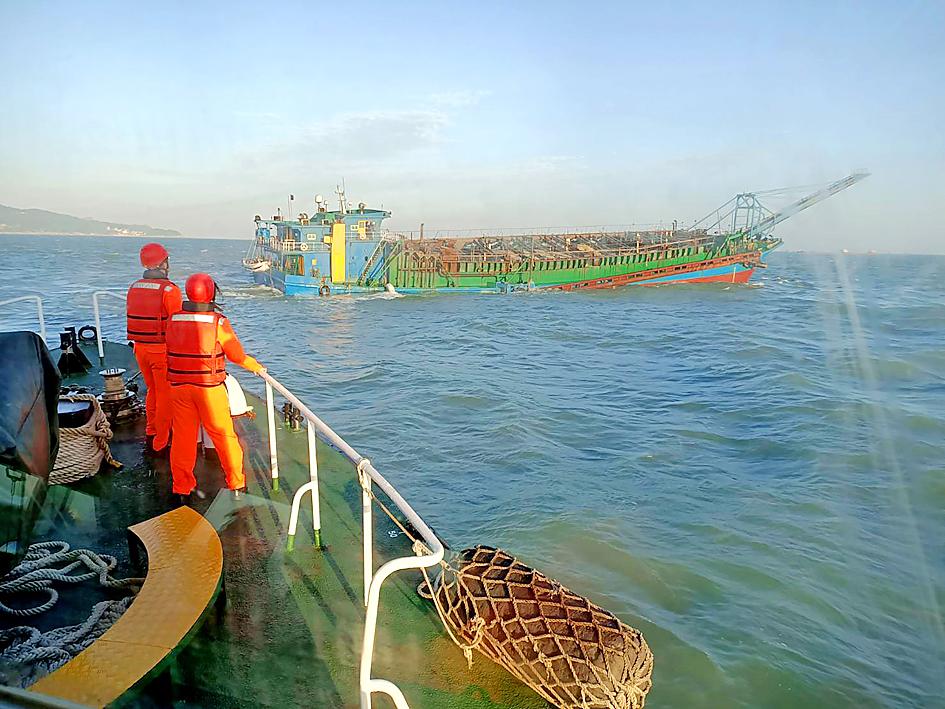The Executive Yuan today is to discuss amendments that would increase penalties for illegal dredging, after hundreds of Chinese vessels were found allegedly looting sand near Matsu.
Ocean Affairs Council Minister Lee Chung-wei (李仲威) yesterday said that 400 to 500 Chinese vessels were spotted on Sunday dredging for sand and gravel in waters between Nangan (南竿) and Juguang (莒光) townships.
After determining whether they were engaged in military activity, the Coast Guard Administration on Tuesday worked with Chinese law enforcement to drive the vessels away, Lee told the Legislative Yuan’s Internal Administration Committee.

Photo courtesy of the Coast Guard Administration via CNA
If there had been any military intent, the Chinese side would not have participated in their removal, he said.
The area within 6km of Matsu is restricted territory, Lee said, adding that the coast guard would chase away vessels that enter the zone illegally.
However, as the waters outside the area are in Chinese jurisdiction and Beijing also condemns the practice, the coast guard works with Chinese law enforcement to drive away dredgers, he said.
Separately, Executive Yuan spokesman Ting Yi-ming (丁怡銘) said that officials are to discuss increasing penalties for illegal dredging to one to seven years in prison and a fine of up to NT$80 million (US$2.77 million).
The proposal would amend the penal provisions of the Act on the Exclusive Economic Zone and the Continental Shelf of the Republic of China (中華民國專屬經濟海域及大陸礁層法) and the Sand and Gravel Excavation Act (土石採取法), Ting said.
It would also require that confiscated ships or other machinery be promptly and properly auctioned, sold or otherwise disposed of, he said.
Article 18 of the exclusive economic zone act stipulates a prison term of up to five years and a fine of up to NT$50 million for those found guilty of intentionally harming natural resources or ecosystems.
Article 36 of the excavation act authorizes a fine of NT$1 million to NT$5 million for those found guilty of extracting sand or gravel without permission, and allows local governments to confiscate equipment.
Chinese ships used to primarily dredge for sand near Kinmen County, but over the past two years have moved closer to Matsu and waters southwest of Penghu County’s Cimei Township (七美) due to climate change effects, Lee said.
In the first nine months of this year, Taiwanese and Chinese patrol boats chased dredging vessels away from Matsu 12 times, he said.
To prevent such activity, Lee said that the council would continue building new ships and dispatching them to the two hotspot areas, with a 1,000-tonne vessel already having been sent to the waters near Matsu.
The council is also in talks with other agencies to build a naval wharf on Matsu to accommodate large vessels, he said.

Rainfall is expected to become more widespread and persistent across central and southern Taiwan over the next few days, with the effects of the weather patterns becoming most prominent between last night and tomorrow, the Central Weather Administration (CWA) said yesterday. Independent meteorologist Daniel Wu (吳德榮) said that based on the latest forecast models of the combination of a low-pressure system and southwesterly winds, rainfall and flooding are expected to continue in central and southern Taiwan from today to Sunday. The CWA also warned of flash floods, thunder and lightning, and strong gusts in these areas, as well as landslides and fallen

WAITING GAME: The US has so far only offered a ‘best rate tariff,’ which officials assume is about 15 percent, the same as Japan, a person familiar with the matter said Taiwan and the US have completed “technical consultations” regarding tariffs and a finalized rate is expected to be released soon, Executive Yuan spokeswoman Michelle Lee (李慧芝) told a news conference yesterday, as a 90-day pause on US President Donald Trump’s “reciprocal” tariffs is set to expire today. The two countries have reached a “certain degree of consensus” on issues such as tariffs, nontariff trade barriers, trade facilitation, supply chain resilience and economic security, Lee said. They also discussed opportunities for cooperation, investment and procurement, she said. A joint statement is still being negotiated and would be released once the US government has made

SOUTH CHINA SEA? The Philippine president spoke of adding more classrooms and power plants, while skipping tensions with China over disputed areas Philippine President Ferdinand Marcos Jr yesterday blasted “useless and crumbling” flood control projects in a state of the nation address that focused on domestic issues after a months-long feud with his vice president. Addressing a joint session of congress after days of rain that left at least 31 dead, Marcos repeated his recent warning that the nation faced a climate change-driven “new normal,” while pledging to investigate publicly funded projects that had failed. “Let’s not pretend, the people know that these projects can breed corruption. Kickbacks ... for the boys,” he said, citing houses that were “swept away” by the floods. “Someone has

‘CRUDE’: The potential countermeasure is in response to South Africa renaming Taiwan’s representative offices and the insistence that it move out of Pretoria Taiwan is considering banning exports of semiconductors to South Africa after the latter unilaterally downgraded and changed the names of Taiwan’s two representative offices, the Ministry of Foreign Affairs (MOFA) said yesterday. On Monday last week, the South African Department of International Relations and Cooperation unilaterally released a statement saying that, as of April 1, the Taipei Liaison Offices in Pretoria and Cape Town had been renamed the “Taipei Commercial Office in Johannesburg” and the “Taipei Commercial Office in Cape Town.” Citing UN General Assembly Resolution 2758, it said that South Africa “recognizes the People’s Republic of China (PRC) as the sole